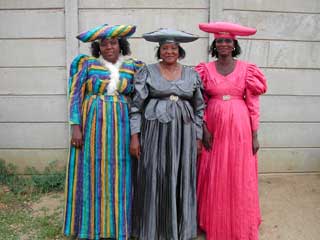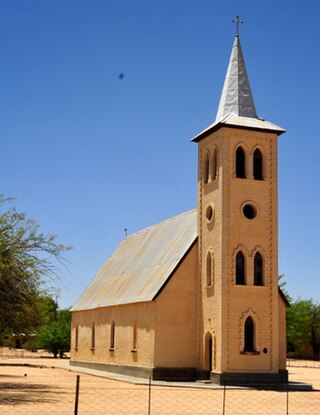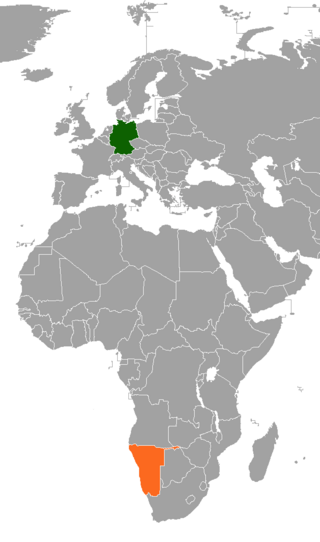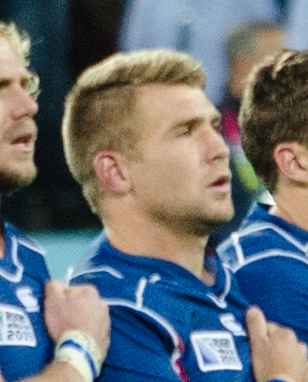
Namibia, officially the Republic of Namibia, is a country in Southern Africa. Its western border is the Atlantic Ocean. It shares land borders with Angola and Zambia to the north, Botswana to the east and South Africa to the east and south. Although it does not border Zimbabwe, less than 200 metres of the Botswanan right bank of the Zambezi River separates the two countries. Its capital and largest city is Windhoek.
The history of Namibia has passed through several distinct stages from being colonised in the late nineteenth century to Namibia's independence on 21 March 1990.

Windhoek is the capital and largest city of Namibia. It is located in central Namibia in the Khomas Highland plateau area, at around 1,700 m (5,600 ft) above sea level, almost exactly at the country's geographical centre. The population of Windhoek, which was 486,169 in 2023, is constantly growing due to a continued migration from other regions in Namibia.

The Herero are a Bantu ethnic group inhabiting parts of Southern Africa. 178,987 Namibians identified as Ovaherero in the 2023 census. They speak Otjiherero, a Bantu language. Though the Herero primarily reside in Namibia, there are also significant populations in Botswana and Angola, and a small number in South Africa. The Hereros in Botswana and South Africa are there because of displacement during the 1904 - 1908 genocide committed by the German Empire.
The music of Namibia includes a number of folk styles, as well as pop, rock, reggae, jazz, house and hip hop.

Nama are an African ethnic group of South Africa, Namibia and Botswana. They traditionally speak the Nama language of the Khoe-Kwadi language family, although many Nama also speak Afrikaans. The Nama People are the largest group of the Khoikhoi people, most of whom have disappeared as a group, except for the Namas. Many of the Nama clans live in Central Namibia and the other smaller groups live in Namaqualand, which today straddles the Namibian border with South Africa.

Hage Gottfried Geingob was a Namibian politician who served as the third president of Namibia from 2015 until his death in February 2024. Geingob was the first prime minister of Namibia from 1990 to 2002, and served again from 2012 to 2015. Between 2008 and 2012 Geingob served as Minister of Trade and Industry. In November 2014, Geingob was elected president of Namibia by an overwhelming margin. In November 2017, Geingob became the third president of the ruling SWAPO Party after winning by a large margin at the party's sixth Congress. He served as the party's president until his death. In August 2018, Geingob began a one-year term as chairperson of the Southern African Development Community.

Otjimbingwe is a settlement in the Erongo Region of central Namibia. Otjimbingwe has approximately 8,000 inhabitants and belongs to the Karibib electoral constituency.
Stefan Ludik is a Namibian musician, television personality, actor, and former cricketer from Windhoek City. He was the first contestant to represent Namibia in the reality television program Big Brother Africa. He is now a popular Afrikaans singer and actor.

Lazarus Shiimi, known by his stage name Gazza, is a Namibian musician.

Germany–Namibia relations are the bilateral relationship of Germany and Namibia. This relationship is of particular importance as Namibia was colonized and occupied by the German Empire in the 19th century. There is also a community of approximately 30,000 German Namibians residing in Namibia today. Both nations are members of the United Nations. Culturally, both countries are part of the Germanosphere.
Naftalie Shigwedha Amukwelele commonly known as D-Naff, is a Namibian multiple award-winning and top selling rapper /singer, actor and a former street gangster. D-Naff sings inspirational Gospel / religious music in the style of kwaito, hip hop, kizomba, dancehall and afro-pop. D-Naff is also a motivational and inspirational speaker and has visited more than 100 schools, Universities and colleges in Namibia including the Namibia University of Science and Technology formerly The Polytechnic of Namibia, Windhoek College of Education, Ongwediva College of Education and the University of Namibia.
Axali Doëseb was a Namibian music composer. He wrote and composed "Namibia, Land of the Brave", which has been the national anthem of the country since 1991. He also served as conductor of the Namibian National Symphony Orchestra.

German South West Africa was a colony of the German Empire from 1884 until 1915, though Germany did not officially recognise its loss of this territory until the 1919 Treaty of Versailles.

Tshuutheni Emvula, sometimes known as Becoming Phill is a Namibian entrepreneur, hip hop record producer, DJ, composer, and video editor from Windhoek, Namibia. He has produced for various Namibian and international artists including Ricky Rick, Gazza, Black Vulcanite, Sunny Boy, TeQuila, Qonja, RUN N.A.M.S., Lize Ehlers, and Zeus.

Johan Deysel is a Namibian professional rugby union player who plays as a centre for Pro D2 club Colomiers and captains the Namibia national team.

Big Ben Kandukira, is a Namibian performing and recording artist.
Malcolm Edwin Moore is a Namibian rugby union player, currently playing with the Namibia national team and the Welwitschias in the South African Currie Cup competition. He usually plays as a winger.
The following is a timeline of the history of the city of Windhoek, Namibia.

Culture in Namibia is a blend of many different people and its culture and customs have absorbed both African and European elements and fused them into a blend of the two. Although the country is urbanising rapidly, a majority of Namibians still live in rural areas and lead largely impoverished lives. It is among these people, however, that cultural tradition survive most strongly.












